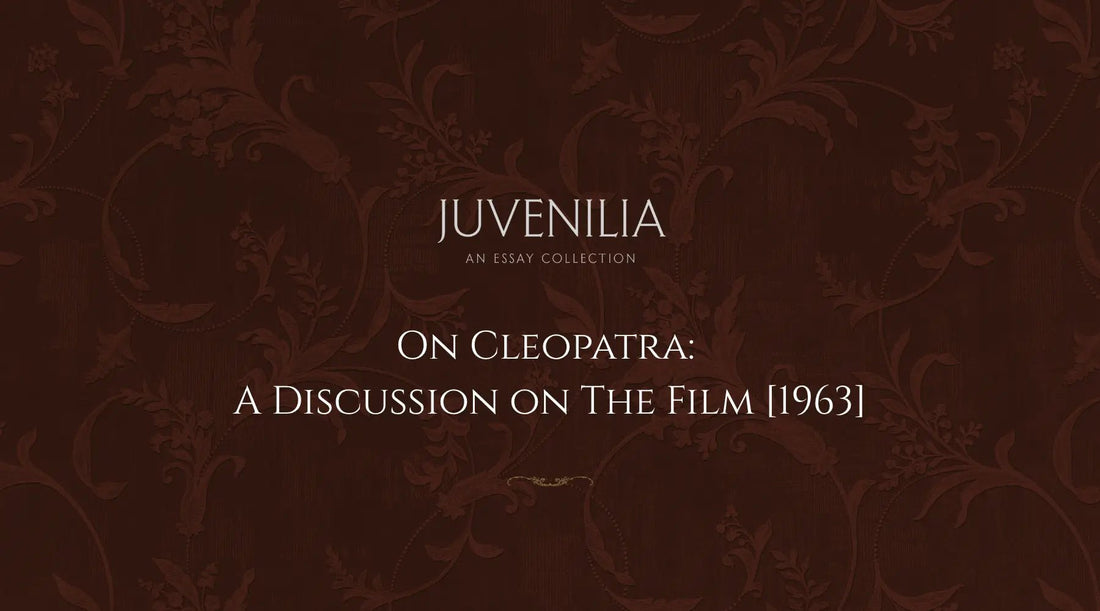
On Cleopatra: A Discussion on the Film [1963]
How does the film portray Cleopatra as the sexually and politically powerful woman? Is this image of female empowerment consistent within the film?
The film portrays Cleopatra as sexually and politically powerful in many ways, but the main ways are through her wit, her charm and charisma, her appearance (clothing and ornaments), her ability to read through the lines so to speak and see truth behind what is not said.
It is fairly consistent through the film, and we see her not only take the throne from her brother—who she was meant to co-rule with—but she also wiggled her way into the lives of two major Roman players, Caesar and Antony. Her sexuality is not without purpose, however. By using her sexuality as a weapon, she was able to give influential heirs, which, in a patriarchy, is of utmost importance. She maintains loyal subjects to the very end, something her male counterparts continually struggle with through the entire film, both dying at the hands of their comrades. Her slaves died at her side, willingly. If that's not loyalty, I don't know what is. (Yes, they were slaves, but Cleopatra died and then they chose to follow orders.)
In terms of consistency, Cleopatra has her ups and downs (as every person does), but she does not allow her feelings to get in the way of the bigger picture. Even when faced with personal loss, she still rules and ensures she does not neglect her duties, something we see Antony do several times—for her. When she flees from the final battle, it was not her shirking her duties, it was basic human instinct of self-preservation.
How does the film present the three main characters, Cleopatra, Caesar, and Antony, and their relationships with each other?
The film portrays Cleopatra as mischievous, competent, headstrong, manipulative, and highly intelligent. The film portrays Caesar as an upstanding, moral leader with military prowess and cunning. The film portrays Antony as a man who tries to do well but is overly concerned with how he is perceived. He is constantly in the shadow of Caesar, and he grows resentful and bitter of Caesar's image.
Cleopatra's relationship with Caesar is an intellectual powerhouse. There is love and mutual understanding. They're intellectually compatible and though they have disagreements at times, it is handled with dignity, maturity, and poise from both parties. Her relationship with Antony seems to be more about lust than love. It seems to be a love-hate relationship more than anything because they fight and argue as much as anything else on screen. There is a difference between lover-spats and genuinely not being on the same page with anything, and the latter seems to predominantly be the case in the film. I do wonder if the only reason Antony wanted her was because Caesar had her first. It seems to be a matter of wanting to "beat" Caesar, and when he finds he can't, he deflects everything. I would argue he was obsessed with the idea of Cleopatra, but nothing more.
The relationship between Caesar and Antony is extremely complicated. Antony places those he loves on a pedestal and then wonders why he cannot obtain the level of success that his loved ones get, and this is true for both Caesar and Cleopatra, though admittedly in different ways. Between Antony and Caesar, however, there is obviously love between them, but after Caesar's death, it spoils for Antony. Antony attempts to pick up the pieces, and when he is hit with obstacles, he always compares himself to Caesar and questions how Caesar would have done in his place. He does not build himself up and seems content to break himself down instead. He is a tragic character who loves deeply, and it destroys him because he does not know how to balance it with himself. When he acts for the rights reasons, he is successful, but the problem is, he does not typically act for the right reasons which led to his demise.
